Mental Health Recovery: Etiology, Intervention, Treatment & Outcomes
VerifiedAdded on 2023/04/10
|18
|1607
|75
Report
AI Summary
This report provides a comprehensive overview of mental health recovery, starting with an introduction to the importance of mental well-being and its impact on individuals and communities. It delves into the etiology of mental health disorders, highlighting physiological, environmental, and biological factors, and discusses early intervention strategies, including recognizing early signs and the role of psychiatric rehabilitation. The report emphasizes evidence-based treatments, person-centered care, and the significance of hope in the recovery process. It also covers specific disorders such as anxiety, bipolar disorder, and psychosis, detailing their treatments, management, and potential outcomes. The report concludes by underscoring the importance of proper assessment and treatment in promoting mental health recovery and poses key questions for further consideration.
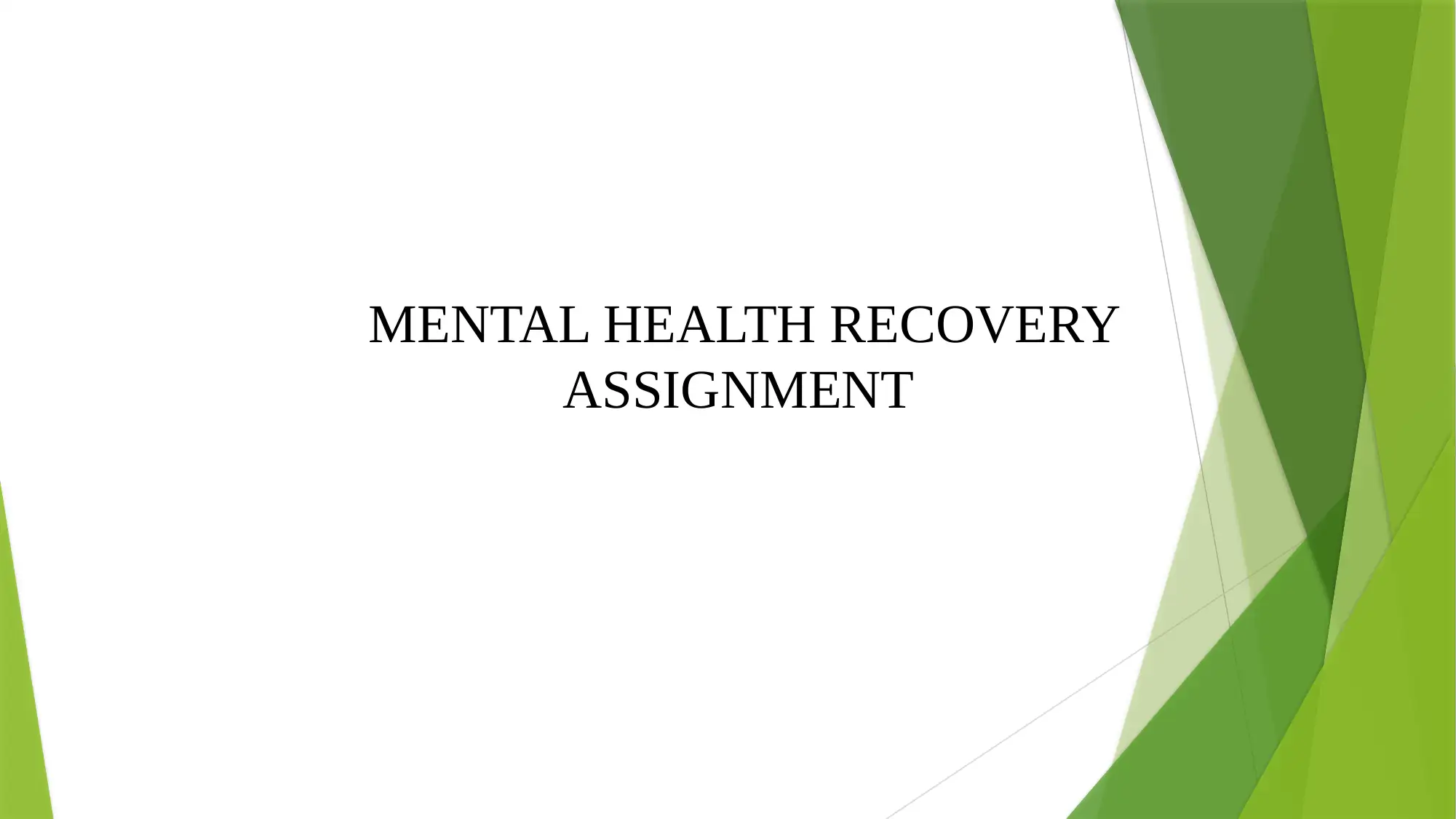
MENTAL HEALTH RECOVERY
ASSIGNMENT
ASSIGNMENT
Paraphrase This Document
Need a fresh take? Get an instant paraphrase of this document with our AI Paraphraser
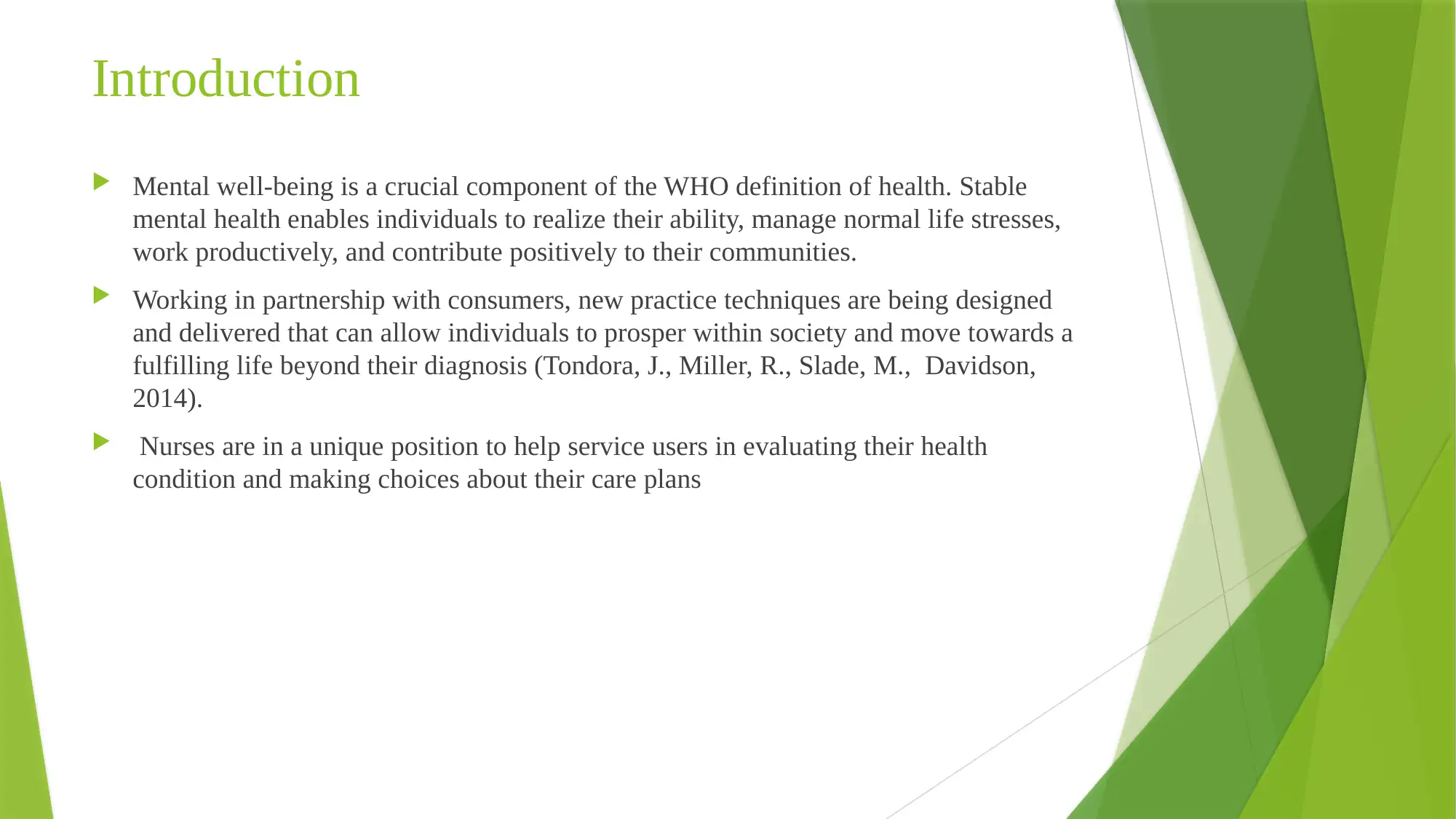
Introduction
Mental well-being is a crucial component of the WHO definition of health. Stable
mental health enables individuals to realize their ability, manage normal life stresses,
work productively, and contribute positively to their communities.
Working in partnership with consumers, new practice techniques are being designed
and delivered that can allow individuals to prosper within society and move towards a
fulfilling life beyond their diagnosis (Tondora, J., Miller, R., Slade, M., Davidson,
2014).
Nurses are in a unique position to help service users in evaluating their health
condition and making choices about their care plans
Mental well-being is a crucial component of the WHO definition of health. Stable
mental health enables individuals to realize their ability, manage normal life stresses,
work productively, and contribute positively to their communities.
Working in partnership with consumers, new practice techniques are being designed
and delivered that can allow individuals to prosper within society and move towards a
fulfilling life beyond their diagnosis (Tondora, J., Miller, R., Slade, M., Davidson,
2014).
Nurses are in a unique position to help service users in evaluating their health
condition and making choices about their care plans
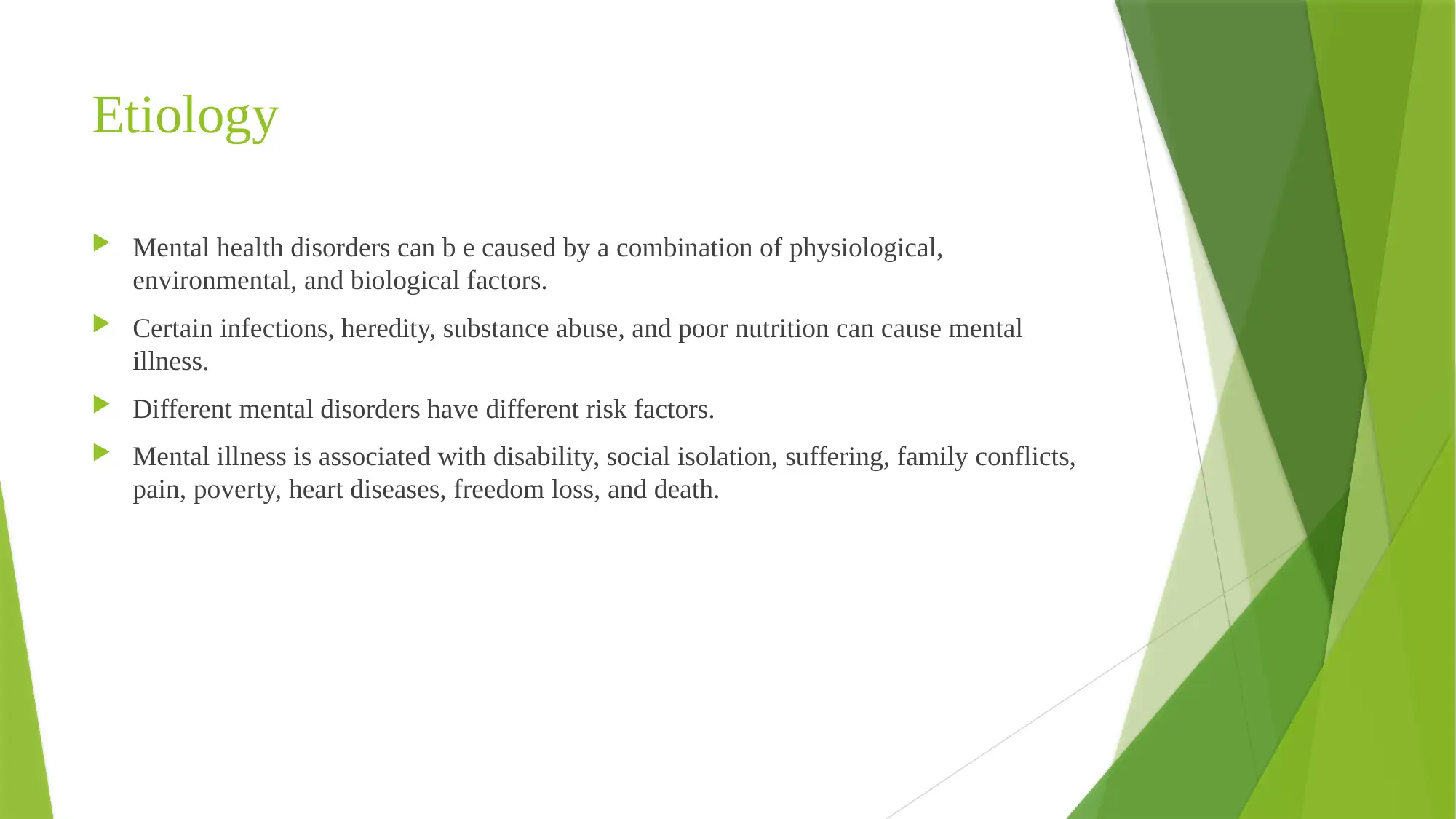
Etiology
Mental health disorders can b e caused by a combination of physiological,
environmental, and biological factors.
Certain infections, heredity, substance abuse, and poor nutrition can cause mental
illness.
Different mental disorders have different risk factors.
Mental illness is associated with disability, social isolation, suffering, family conflicts,
pain, poverty, heart diseases, freedom loss, and death.
Mental health disorders can b e caused by a combination of physiological,
environmental, and biological factors.
Certain infections, heredity, substance abuse, and poor nutrition can cause mental
illness.
Different mental disorders have different risk factors.
Mental illness is associated with disability, social isolation, suffering, family conflicts,
pain, poverty, heart diseases, freedom loss, and death.
⊘ This is a preview!⊘
Do you want full access?
Subscribe today to unlock all pages.

Trusted by 1+ million students worldwide
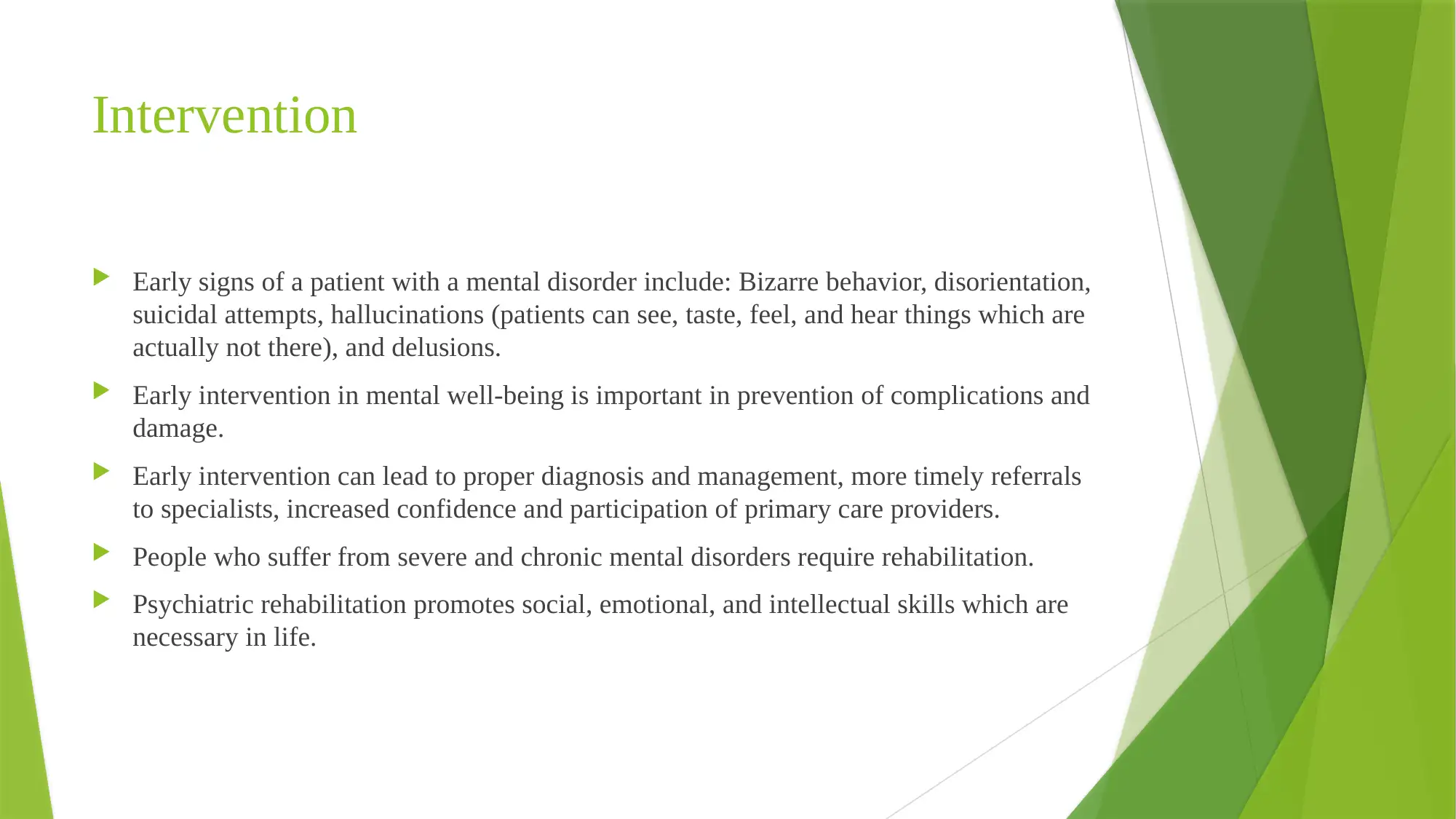
Intervention
Early signs of a patient with a mental disorder include: Bizarre behavior, disorientation,
suicidal attempts, hallucinations (patients can see, taste, feel, and hear things which are
actually not there), and delusions.
Early intervention in mental well-being is important in prevention of complications and
damage.
Early intervention can lead to proper diagnosis and management, more timely referrals
to specialists, increased confidence and participation of primary care providers.
People who suffer from severe and chronic mental disorders require rehabilitation.
Psychiatric rehabilitation promotes social, emotional, and intellectual skills which are
necessary in life.
Early signs of a patient with a mental disorder include: Bizarre behavior, disorientation,
suicidal attempts, hallucinations (patients can see, taste, feel, and hear things which are
actually not there), and delusions.
Early intervention in mental well-being is important in prevention of complications and
damage.
Early intervention can lead to proper diagnosis and management, more timely referrals
to specialists, increased confidence and participation of primary care providers.
People who suffer from severe and chronic mental disorders require rehabilitation.
Psychiatric rehabilitation promotes social, emotional, and intellectual skills which are
necessary in life.
Paraphrase This Document
Need a fresh take? Get an instant paraphrase of this document with our AI Paraphraser
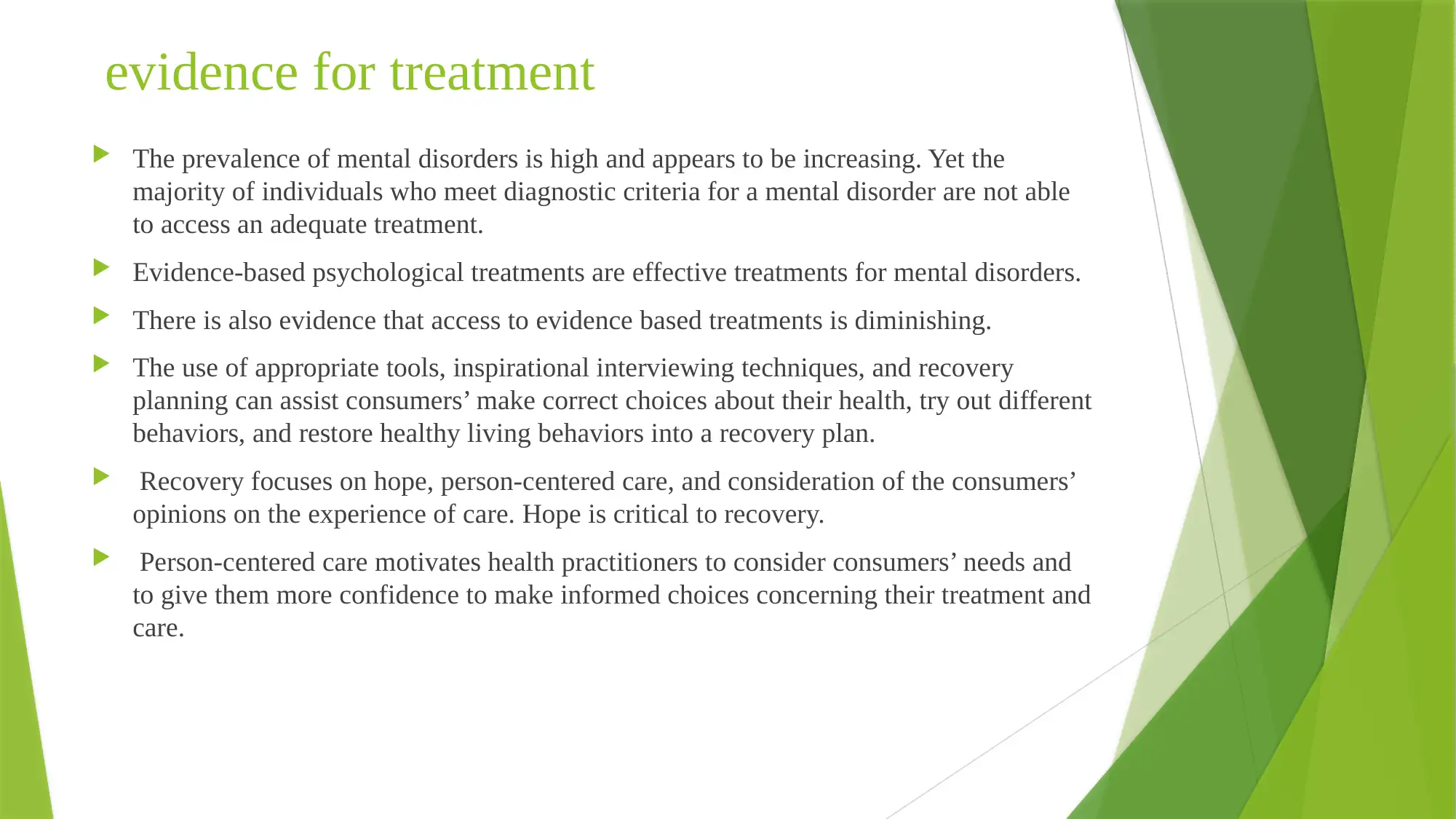
evidence for treatment
The prevalence of mental disorders is high and appears to be increasing. Yet the
majority of individuals who meet diagnostic criteria for a mental disorder are not able
to access an adequate treatment.
Evidence-based psychological treatments are effective treatments for mental disorders.
There is also evidence that access to evidence based treatments is diminishing.
The use of appropriate tools, inspirational interviewing techniques, and recovery
planning can assist consumers’ make correct choices about their health, try out different
behaviors, and restore healthy living behaviors into a recovery plan.
Recovery focuses on hope, person-centered care, and consideration of the consumers’
opinions on the experience of care. Hope is critical to recovery.
Person-centered care motivates health practitioners to consider consumers’ needs and
to give them more confidence to make informed choices concerning their treatment and
care.
The prevalence of mental disorders is high and appears to be increasing. Yet the
majority of individuals who meet diagnostic criteria for a mental disorder are not able
to access an adequate treatment.
Evidence-based psychological treatments are effective treatments for mental disorders.
There is also evidence that access to evidence based treatments is diminishing.
The use of appropriate tools, inspirational interviewing techniques, and recovery
planning can assist consumers’ make correct choices about their health, try out different
behaviors, and restore healthy living behaviors into a recovery plan.
Recovery focuses on hope, person-centered care, and consideration of the consumers’
opinions on the experience of care. Hope is critical to recovery.
Person-centered care motivates health practitioners to consider consumers’ needs and
to give them more confidence to make informed choices concerning their treatment and
care.
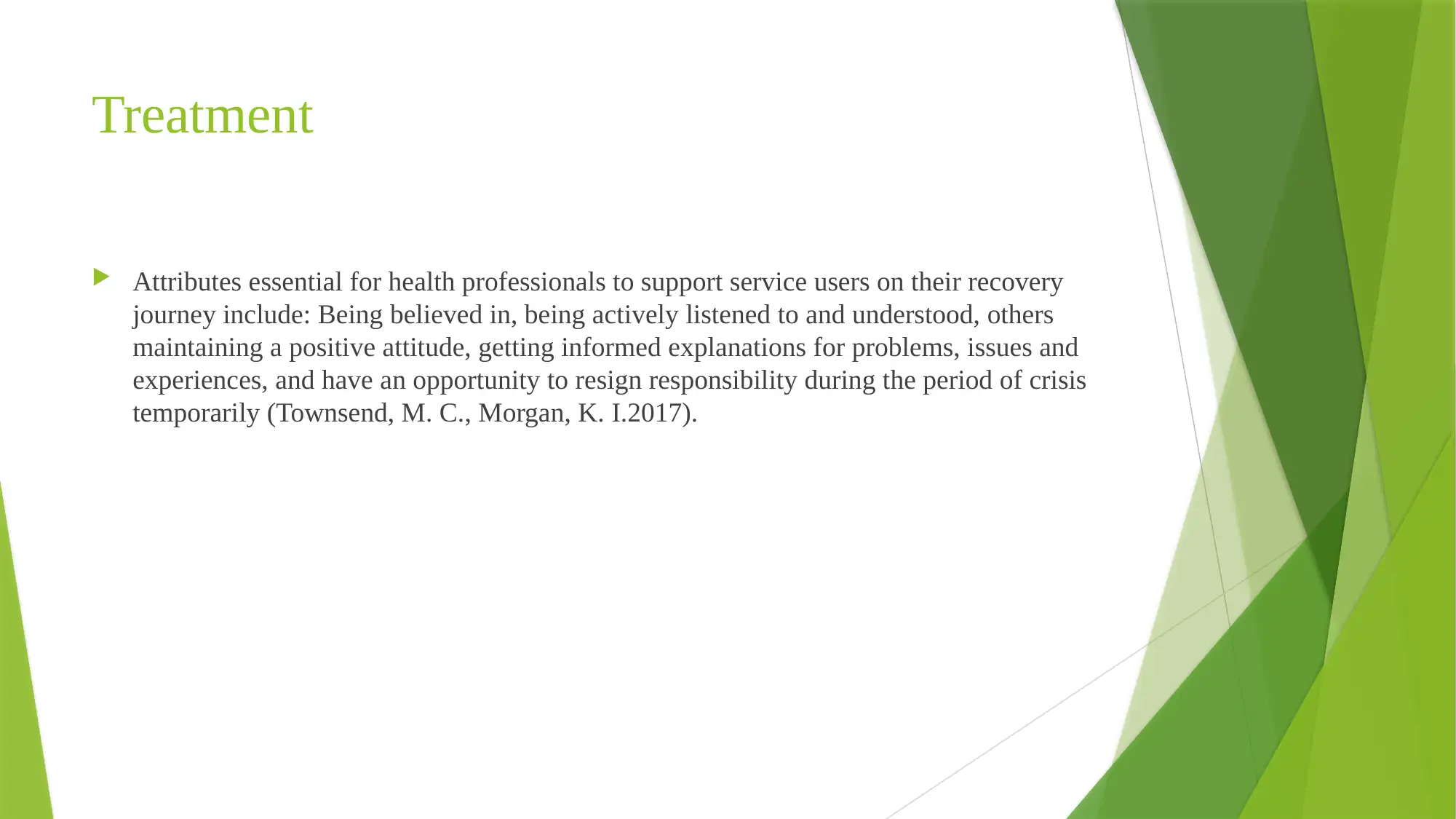
Treatment
Attributes essential for health professionals to support service users on their recovery
journey include: Being believed in, being actively listened to and understood, others
maintaining a positive attitude, getting informed explanations for problems, issues and
experiences, and have an opportunity to resign responsibility during the period of crisis
temporarily (Townsend, M. C., Morgan, K. I.2017).
Attributes essential for health professionals to support service users on their recovery
journey include: Being believed in, being actively listened to and understood, others
maintaining a positive attitude, getting informed explanations for problems, issues and
experiences, and have an opportunity to resign responsibility during the period of crisis
temporarily (Townsend, M. C., Morgan, K. I.2017).
⊘ This is a preview!⊘
Do you want full access?
Subscribe today to unlock all pages.

Trusted by 1+ million students worldwide
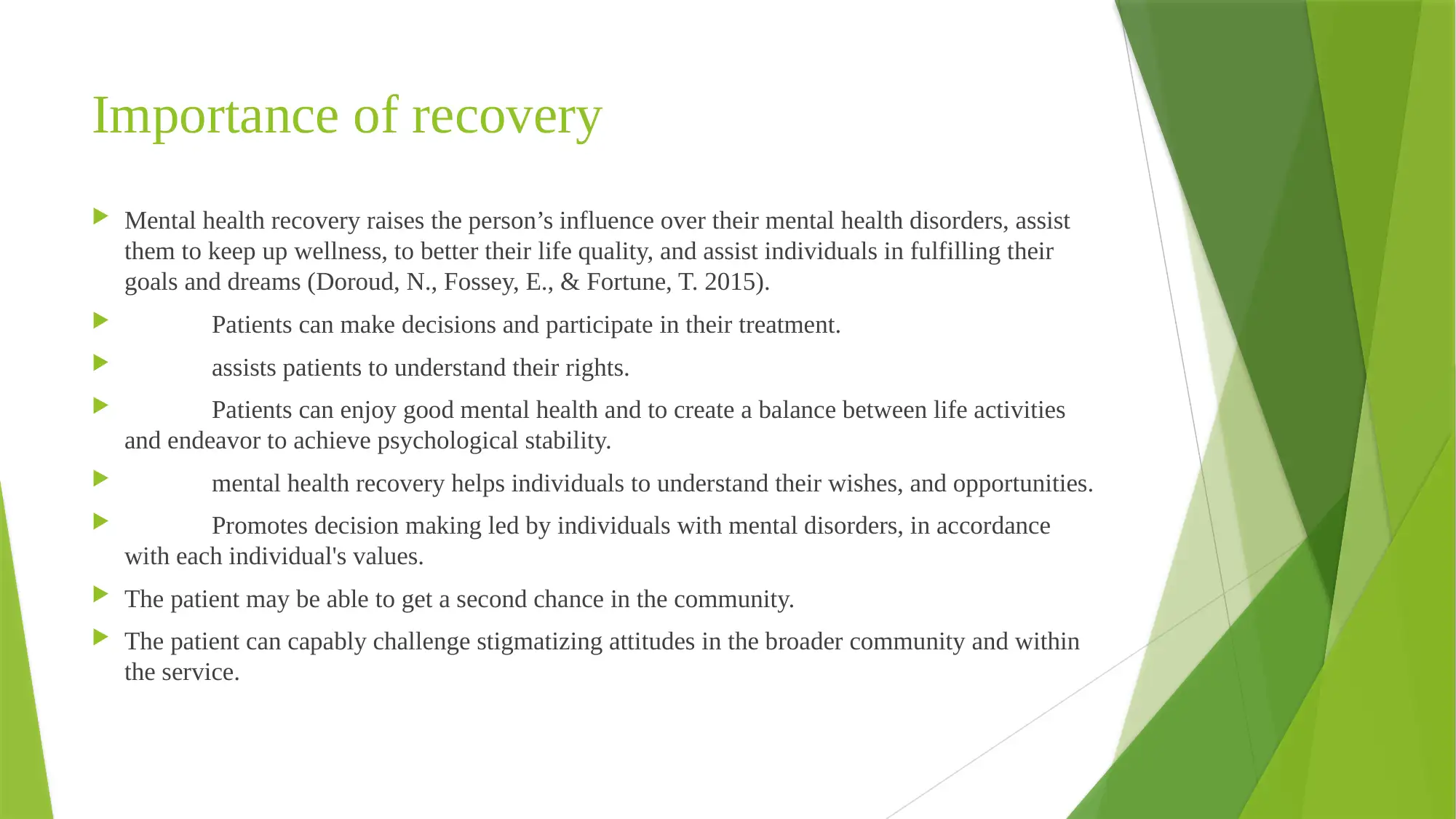
Importance of recovery
Mental health recovery raises the person’s influence over their mental health disorders, assist
them to keep up wellness, to better their life quality, and assist individuals in fulfilling their
goals and dreams (Doroud, N., Fossey, E., & Fortune, T. 2015).
Patients can make decisions and participate in their treatment.
assists patients to understand their rights.
Patients can enjoy good mental health and to create a balance between life activities
and endeavor to achieve psychological stability.
mental health recovery helps individuals to understand their wishes, and opportunities.
Promotes decision making led by individuals with mental disorders, in accordance
with each individual's values.
The patient may be able to get a second chance in the community.
The patient can capably challenge stigmatizing attitudes in the broader community and within
the service.
Mental health recovery raises the person’s influence over their mental health disorders, assist
them to keep up wellness, to better their life quality, and assist individuals in fulfilling their
goals and dreams (Doroud, N., Fossey, E., & Fortune, T. 2015).
Patients can make decisions and participate in their treatment.
assists patients to understand their rights.
Patients can enjoy good mental health and to create a balance between life activities
and endeavor to achieve psychological stability.
mental health recovery helps individuals to understand their wishes, and opportunities.
Promotes decision making led by individuals with mental disorders, in accordance
with each individual's values.
The patient may be able to get a second chance in the community.
The patient can capably challenge stigmatizing attitudes in the broader community and within
the service.
Paraphrase This Document
Need a fresh take? Get an instant paraphrase of this document with our AI Paraphraser
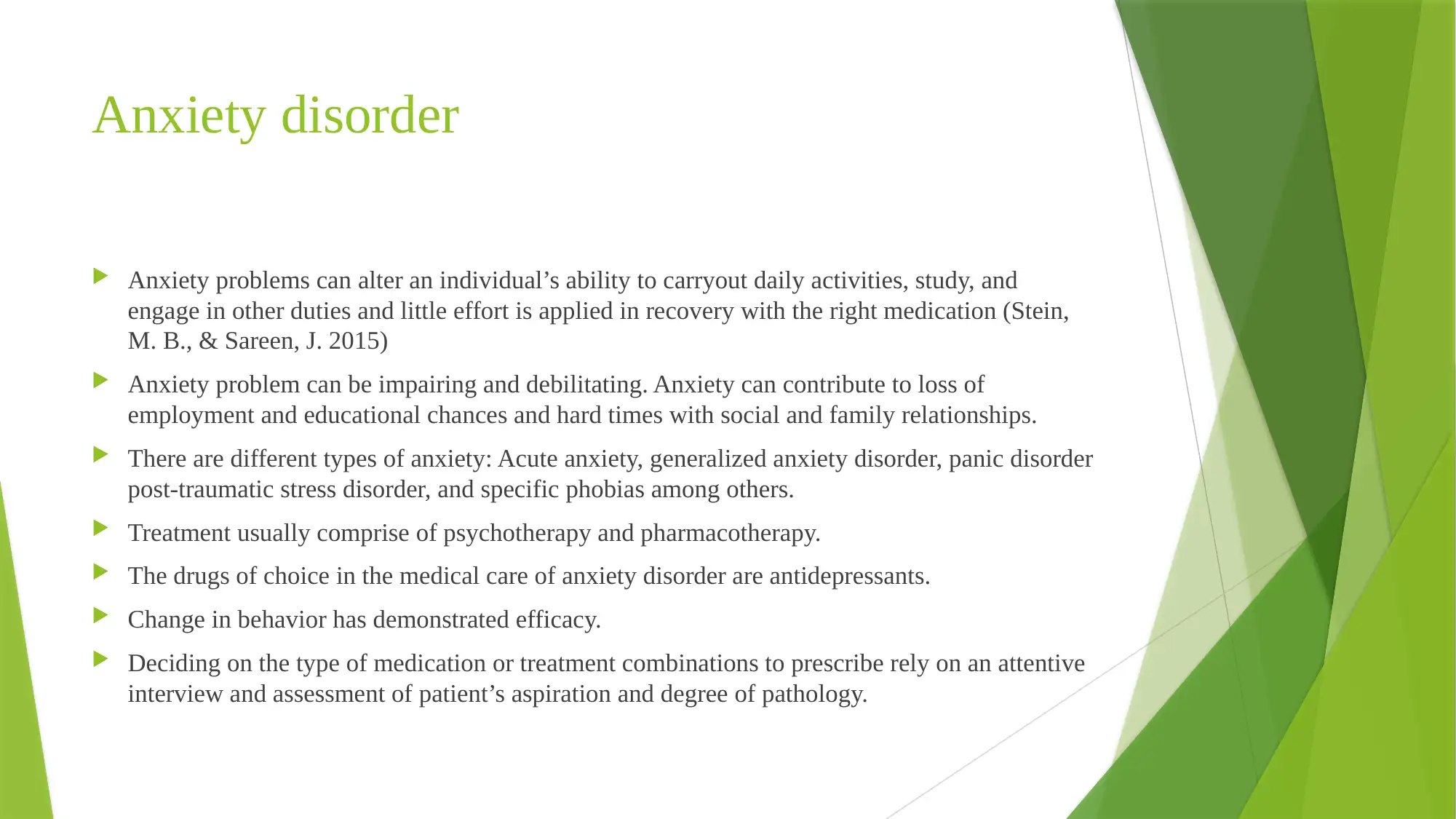
Anxiety disorder
Anxiety problems can alter an individual’s ability to carryout daily activities, study, and
engage in other duties and little effort is applied in recovery with the right medication (Stein,
M. B., & Sareen, J. 2015)
Anxiety problem can be impairing and debilitating. Anxiety can contribute to loss of
employment and educational chances and hard times with social and family relationships.
There are different types of anxiety: Acute anxiety, generalized anxiety disorder, panic disorder
post-traumatic stress disorder, and specific phobias among others.
Treatment usually comprise of psychotherapy and pharmacotherapy.
The drugs of choice in the medical care of anxiety disorder are antidepressants.
Change in behavior has demonstrated efficacy.
Deciding on the type of medication or treatment combinations to prescribe rely on an attentive
interview and assessment of patient’s aspiration and degree of pathology.
Anxiety problems can alter an individual’s ability to carryout daily activities, study, and
engage in other duties and little effort is applied in recovery with the right medication (Stein,
M. B., & Sareen, J. 2015)
Anxiety problem can be impairing and debilitating. Anxiety can contribute to loss of
employment and educational chances and hard times with social and family relationships.
There are different types of anxiety: Acute anxiety, generalized anxiety disorder, panic disorder
post-traumatic stress disorder, and specific phobias among others.
Treatment usually comprise of psychotherapy and pharmacotherapy.
The drugs of choice in the medical care of anxiety disorder are antidepressants.
Change in behavior has demonstrated efficacy.
Deciding on the type of medication or treatment combinations to prescribe rely on an attentive
interview and assessment of patient’s aspiration and degree of pathology.
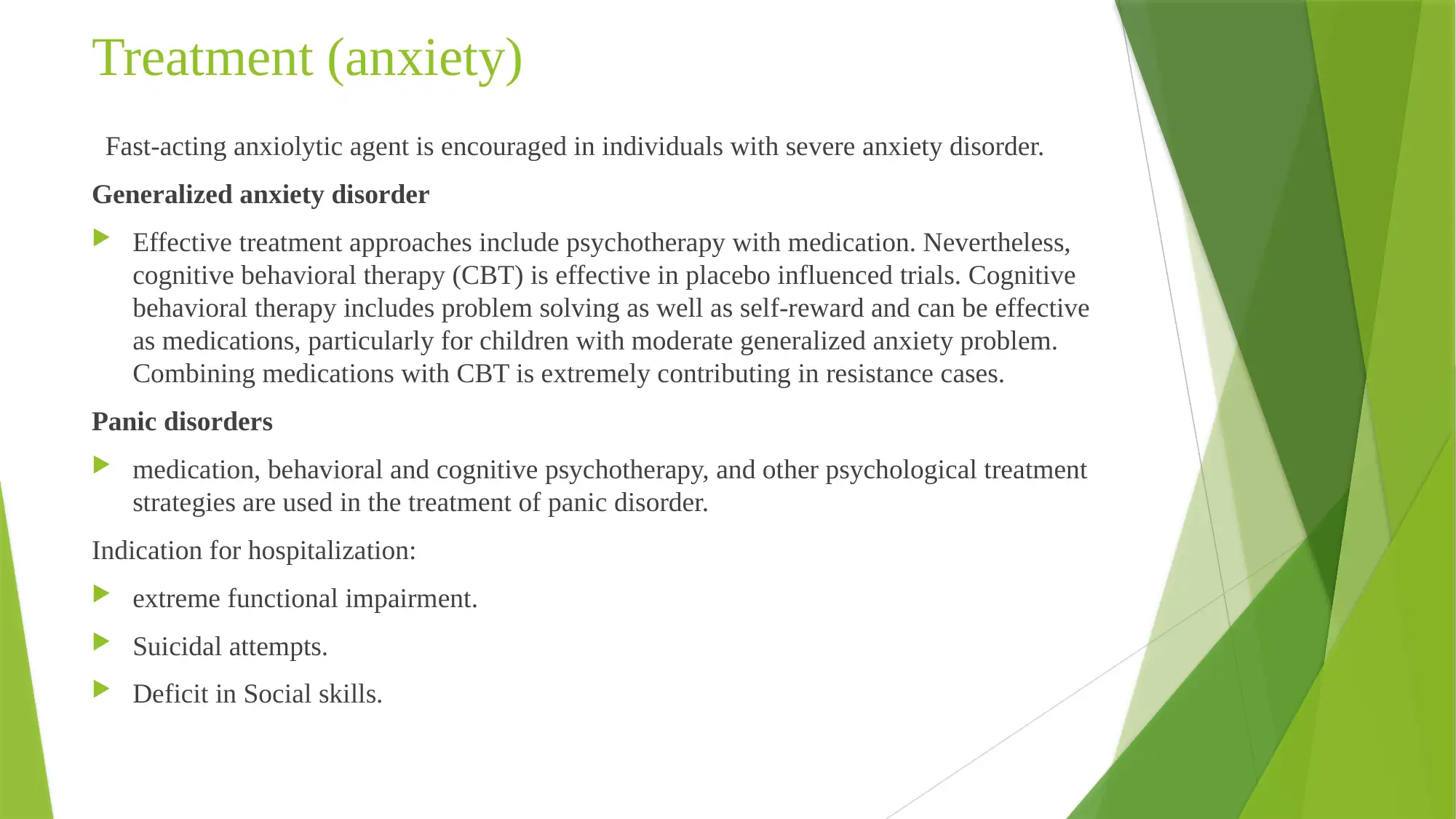
Treatment (anxiety)
Fast-acting anxiolytic agent is encouraged in individuals with severe anxiety disorder.
Generalized anxiety disorder
Effective treatment approaches include psychotherapy with medication. Nevertheless,
cognitive behavioral therapy (CBT) is effective in placebo influenced trials. Cognitive
behavioral therapy includes problem solving as well as self-reward and can be effective
as medications, particularly for children with moderate generalized anxiety problem.
Combining medications with CBT is extremely contributing in resistance cases.
Panic disorders
medication, behavioral and cognitive psychotherapy, and other psychological treatment
strategies are used in the treatment of panic disorder.
Indication for hospitalization:
extreme functional impairment.
Suicidal attempts.
Deficit in Social skills.
Fast-acting anxiolytic agent is encouraged in individuals with severe anxiety disorder.
Generalized anxiety disorder
Effective treatment approaches include psychotherapy with medication. Nevertheless,
cognitive behavioral therapy (CBT) is effective in placebo influenced trials. Cognitive
behavioral therapy includes problem solving as well as self-reward and can be effective
as medications, particularly for children with moderate generalized anxiety problem.
Combining medications with CBT is extremely contributing in resistance cases.
Panic disorders
medication, behavioral and cognitive psychotherapy, and other psychological treatment
strategies are used in the treatment of panic disorder.
Indication for hospitalization:
extreme functional impairment.
Suicidal attempts.
Deficit in Social skills.
⊘ This is a preview!⊘
Do you want full access?
Subscribe today to unlock all pages.

Trusted by 1+ million students worldwide
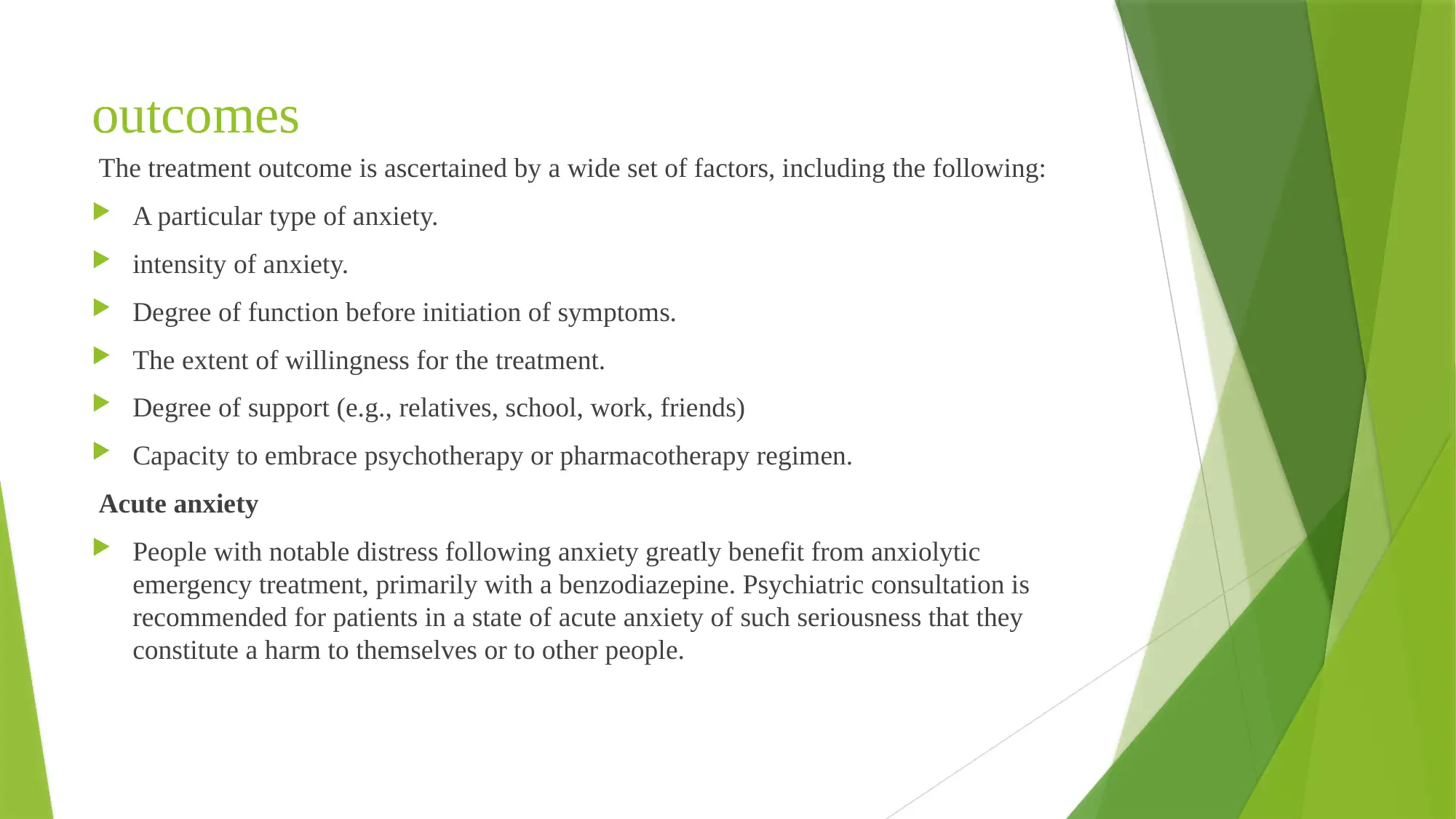
outcomes
The treatment outcome is ascertained by a wide set of factors, including the following:
A particular type of anxiety.
intensity of anxiety.
Degree of function before initiation of symptoms.
The extent of willingness for the treatment.
Degree of support (e.g., relatives, school, work, friends)
Capacity to embrace psychotherapy or pharmacotherapy regimen.
Acute anxiety
People with notable distress following anxiety greatly benefit from anxiolytic
emergency treatment, primarily with a benzodiazepine. Psychiatric consultation is
recommended for patients in a state of acute anxiety of such seriousness that they
constitute a harm to themselves or to other people.
The treatment outcome is ascertained by a wide set of factors, including the following:
A particular type of anxiety.
intensity of anxiety.
Degree of function before initiation of symptoms.
The extent of willingness for the treatment.
Degree of support (e.g., relatives, school, work, friends)
Capacity to embrace psychotherapy or pharmacotherapy regimen.
Acute anxiety
People with notable distress following anxiety greatly benefit from anxiolytic
emergency treatment, primarily with a benzodiazepine. Psychiatric consultation is
recommended for patients in a state of acute anxiety of such seriousness that they
constitute a harm to themselves or to other people.
Paraphrase This Document
Need a fresh take? Get an instant paraphrase of this document with our AI Paraphraser
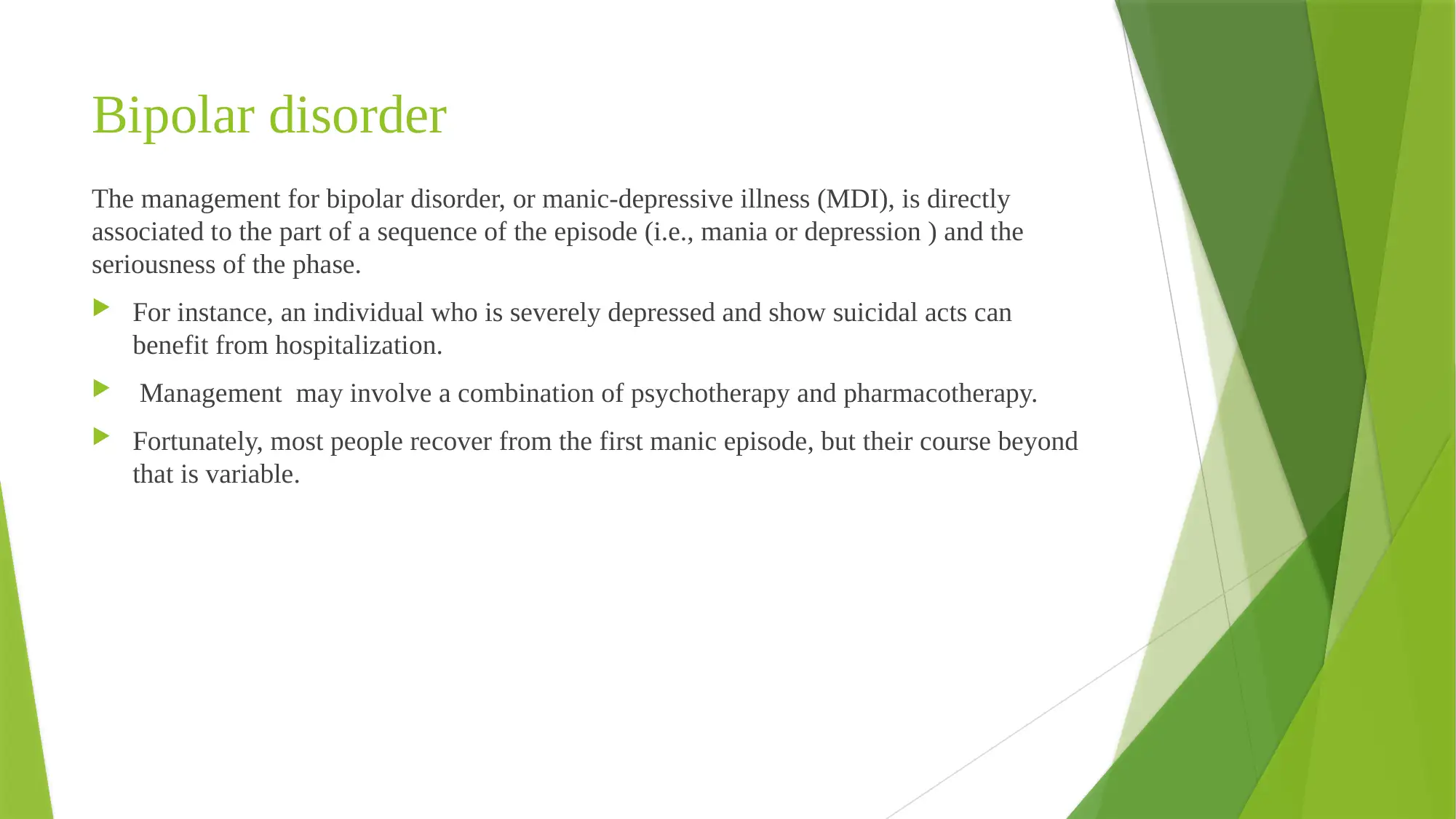
Bipolar disorder
The management for bipolar disorder, or manic-depressive illness (MDI), is directly
associated to the part of a sequence of the episode (i.e., mania or depression ) and the
seriousness of the phase.
For instance, an individual who is severely depressed and show suicidal acts can
benefit from hospitalization.
Management may involve a combination of psychotherapy and pharmacotherapy.
Fortunately, most people recover from the first manic episode, but their course beyond
that is variable.
The management for bipolar disorder, or manic-depressive illness (MDI), is directly
associated to the part of a sequence of the episode (i.e., mania or depression ) and the
seriousness of the phase.
For instance, an individual who is severely depressed and show suicidal acts can
benefit from hospitalization.
Management may involve a combination of psychotherapy and pharmacotherapy.
Fortunately, most people recover from the first manic episode, but their course beyond
that is variable.
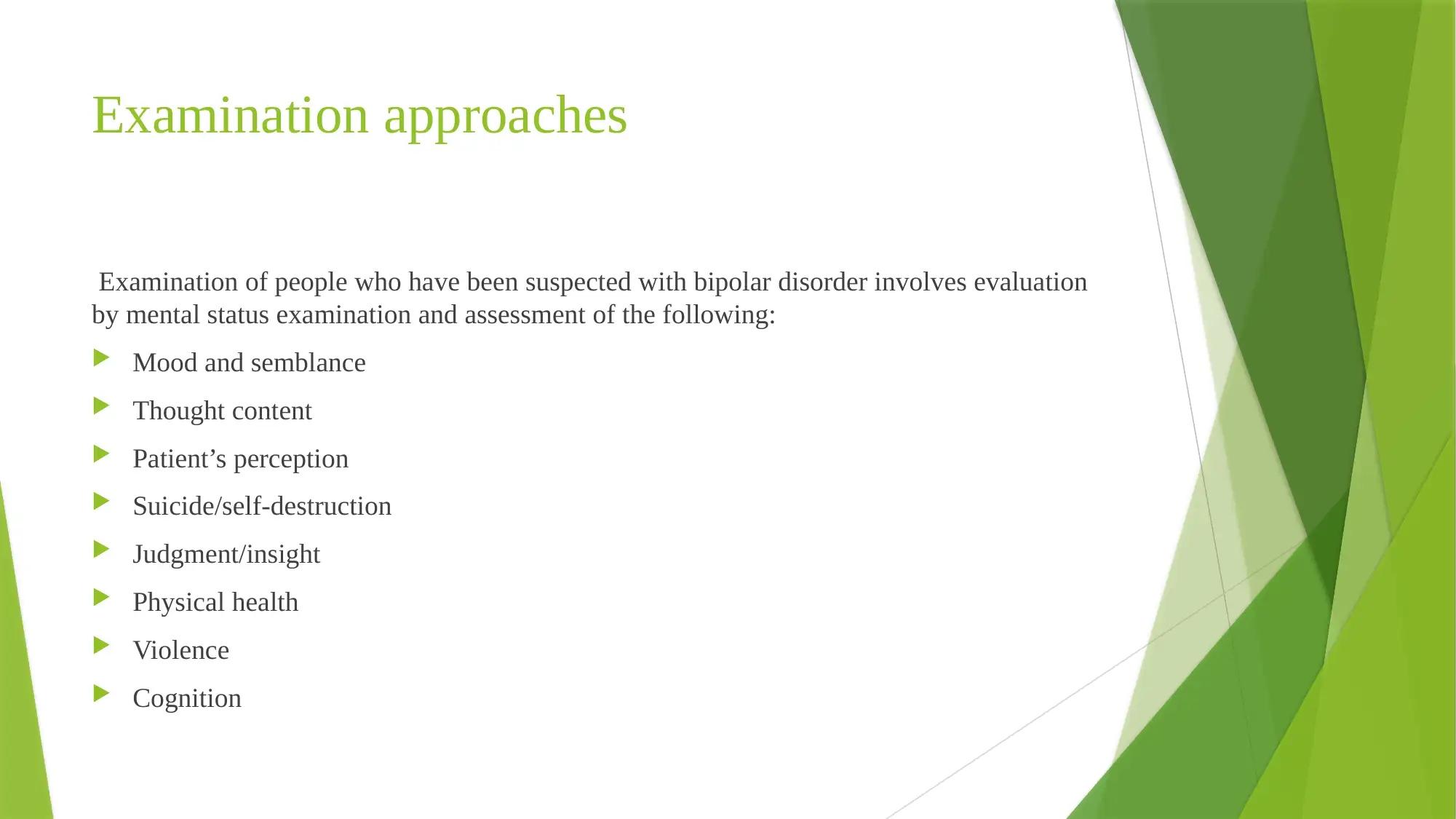
Examination approaches
Examination of people who have been suspected with bipolar disorder involves evaluation
by mental status examination and assessment of the following:
Mood and semblance
Thought content
Patient’s perception
Suicide/self-destruction
Judgment/insight
Physical health
Violence
Cognition
Examination of people who have been suspected with bipolar disorder involves evaluation
by mental status examination and assessment of the following:
Mood and semblance
Thought content
Patient’s perception
Suicide/self-destruction
Judgment/insight
Physical health
Violence
Cognition
⊘ This is a preview!⊘
Do you want full access?
Subscribe today to unlock all pages.

Trusted by 1+ million students worldwide
1 out of 18
Related Documents
Your All-in-One AI-Powered Toolkit for Academic Success.
+13062052269
info@desklib.com
Available 24*7 on WhatsApp / Email
![[object Object]](/_next/static/media/star-bottom.7253800d.svg)
Unlock your academic potential
Copyright © 2020–2026 A2Z Services. All Rights Reserved. Developed and managed by ZUCOL.





